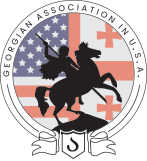Georgia, one of the most ancient countries in the world, is situated at the cross-roads of Europe and Asia. It occupies 69,700 sq. km between the Black and Caspian Seas (about the size of Ireland), with a population of 4,661,473 people. Georgia has many historic cities including the capital, Tbilisi, as well as several large and vital ports on the Black Sea. Because of its cosmopolitan flair, many consider Tbilisi to be the Paris of the Caucasus.
The State language, Georgian, is over 2,000 years old. The Georgian alphabet dates back to the third century BC, and is one of a small number of phonemic alphabets still in use today. Georgian is the predominant language of the Kartvelian, or South Caucasian language family, and is linguistically distinct from Indo-European languages. Spoken by more than 4 million people, the Georgian language underpins an extensive literary and religious history. Around A.D. 330 Georgia was proclaimed Christian by King Mirian. From this point, the Georgian language developed and grew out of the biblical literature that emanated from Mount Sinai.
Although Georgia was annexed by Russia in 1801, Georgians never gave up their fight for independence. Georgia regained its sovereignty in 1918 and was an independent democracy until 1921. After 70 years of communist suppression, Georgia once again reclaimed its independence in 1991.

